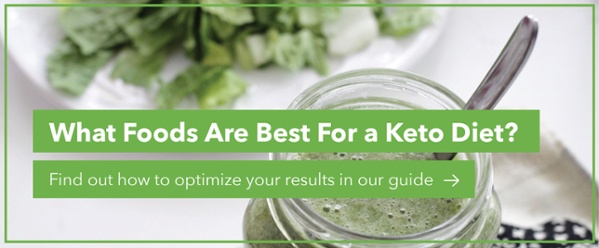
How many times a month do you hear this in the exam room?
“I try so hard to be careful with my diet, and I still struggle to keep the weight off.”
Weight loss is a never-ending struggle for so many people, exacerbated by the conflicting messages they get about “the right way” to lose weight and keep the pounds off.
What people often don’t realize is how hormonal imbalances affect their weight loss goals. Some diets are better than others at impacting this underlying issue. We talked to Dr. Ramneek Bhogal, Professor at Life Chiropractic College West and functional medicine practitioner, about the effects of the keto diet and using ketone supplements to promote weight loss in patients.*

Ketosis and Hormone Regulation
Dr. Bhogal notes that patients are usually most concerned with weight, and not really thinking about things like metabolic health or insulin regulation but it’s those underlying imbalances we need to address through functional medicine.
The keto diet helps the body achieve a state called ketosis. Through specific food choices that restrict carbohydrates and sugars while making healthy fats more available in the body, the keto diet helps the body burn fat for fuel instead of carbohydrates. The body is considered “in ketosis” once it reaches that state.
Steroid-based hormones and sex hormones are primarily made from healthy levels of cholesterol. The keto diet can help patients stabilize cardiometabolic health by:
- maintaining healthy blood pressure
- balancing healthy and unhealthy fats
- encouraging the production of key hormones
- regulating insulin resistance
On the keto diet, fat burning kicks in after five to seven days, or sometimes up to two weeks after beginning the diet. While in ketosis, patients may experience sluggishness or a dip in energy as their metabolism transitions from burning sugar to fat for fuel. Some people may experience a detoxification process that can produce headaches and joint discomfort during this time.
Exogenous Ketones
Exogenous ketone supplements can help patients on the keto diet get through the hallmark sluggishness of metabolic transition a little quicker by boosting energy, initiating ketosis faster, and blunting those negative effects.
Ketone supplements can also be useful if the patient will be taking a planned break from the keto diet. If your patient will be attending a wedding or barbeque where food choices will be more unpredictable, recommend use of exogenous ketone supplements to help them maintain their ketogenic state or stay closer to that state, as ketosis is an all or nothing situation.
The Body’s Response to Ketosis
Dr. Bhogal says that individual responses vary. One patient may see changes in their health and wellness after a few weeks of being in ketosis, while another patient may see results a few months later. Sustained weight loss leads to stable hormonal shifts as energy metabolism changes. A number of physiological issues can be positively affected with cognitive and neurological impact by a sustained keto diet.
Who Should Use the Keto Diet?
Most people could benefit from restricting processed sugar and carbs via the keto diet, but there are circumstances where this approach would not be recommended.
If a woman is pregnant or breastfeeding, the keto diet may not be the best choice. In this case, a healthy low glycemic index diet is a good compromise.
Dr. Bhogal uses caution when recommending the keto diet to patients who have gout, because protein can be detrimental to some degree. If a patient does have gout but could otherwise benefit from the keto diet, it’s important to take his or her health history into consideration.
People with food sensitivities or allergies may not be able to use the keto diet. Likewise, vegetarians and vegans will have a hard time reaching a ketogenic state.
Encouraging Compliance
We know motivation is easy for some people and fleeting for others. The good news is our culture has slowly started to recognize that good health is a priority for many consumers.
There’s more awareness today about gluten and the impact of carbohydrates on the body, and many restaurants have made healthy food choices more accessible to patrons. This makes compliance a little easier.
Dr. Bhogal also notes that patients maintain compliance more easily when they’re educated about health issues and how ketosis can bridge an issue like weight to underlying issues like hormone regulation. When they understand how fixing a hormonal imbalance can lead to better results and improved vitality, people are empowered to make much healthier choices in their lives.
Reducing carbohydrates and controlling the amount of processed sugar consumed is a health boon for most people, and the keto diet can be very beneficial under the right circumstances. Take a look at your patient’s health history, and use caution with exogenous ketonic supplements as you guide them toward wellness and sustained weight loss. The better people understand how the systems in their body work together, the more they will become an asset to their own health goals.
*These statements have not been evaluated by the Food and Drug Administration. This product is not intended to diagnose, treat, cure or prevent any disease.













-1.jpg)





